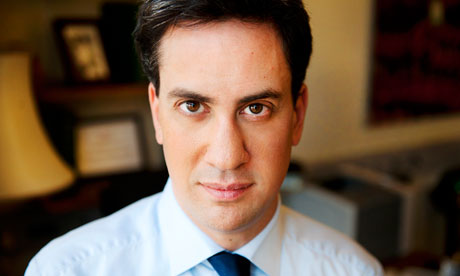 Ed Miliband: 'There is nothing anti-business about cleansing cheats, asset-strippers and vultures from honest savings and good business enterprise.'
Ed Miliband: 'There is nothing anti-business about cleansing cheats, asset-strippers and vultures from honest savings and good business enterprise.'The Guardian:
Labour's values count even more in hard times. David Cameron has to agree: this could be a tipping point for fat cat Britain
The unthinkable is dismissed as blue-sky nonsense, but persistence moves the ice floes of public opinion. From factory acts and boys up chimneys, to income tax, pensions, NHS, abolition of the death penalty, human rights, divorce, abortion, anti-racism laws and the smoking ban, all were won against the odds. It took from 1909 to 1948 for Beatrice Webb's minority report to become the welfare state: against the drag-anchor of conservatism, campaigns for social justice usually win eventually. The broad sweep of history raises optimism. That's why the left is essentially optimistic, and the right better-yesterday pessimists, feeling that anchor dragged unwillingly towards progress.
But in recent decades Britain's story has not always read that way, under a more brutal brand of capitalism. For 100 years incomes grew more equal, but since the 1980s that has gone into reverse, often in leaps and bounds, as the big bang blew the lid off top pay, trade unions lost strength to prevent half the population's incomes stagnating, and unchecked property bubbles accelerated wealth difference. Economic fatalism was law: governments must never interfere, markets are sovereign and politics effectively dead. Cameron held that line: lay a finger on capitalism and the golden goose gets it. That makes this tipping point so important: now he admits the deformities of "crony capitalism" there's no going back. The question has changed to who can fix it, and how.
Miliband owns this turf: he earned it with his conference speech, considering the contempt from Cameron's press and Blairites fearing he'd fatally broken the New Labour formula. Now he says he is breaking with that Labour past, and Cameron's present. There is nothing anti-business about cleansing cheats, asset-strippers and vultures from honest savings and good business enterprise: Cameron has been forced to agree.
How has this change happened? UK Uncut's pithy demonstrations at TopShop and Vodafone graphically exposed tax avoidance. The Guardian's Tax Gap series on companies avoiding £25bn tax through havens and loopholes provided facts. Occupy captured a public anger that conventional politics ignored. The High Pay Commission, set up by the left-leaning thinktank Compass, proved hugely influential, as did Will Hutton's report on high pay in the public sector, blaming City contamination. London Citizens galvanised communities. Avaaz and 38 Degrees with their petitions raised the decibels. Drip, drip, drip, the ice thaws, and the outlandish becomes conventional when working with the grain of public opinion.
The Nordics and Germany flourish in contrast to the dysfunctional UK because our wealth distribution is among the most unjust: so finds the latest report from the OECD, the hard-boiled economic thinktank not known for leftist thinking. Here's fertile ground for Miliband's "responsible capitalism" that challenges "vested interests", such as the near-cartels of rail and energy industries. He plans early intervention to stop runaway theft by the few, shifting resources to home-building and growth creation. Will the other side mock as loudly now? Or will it recognise he was right in his conference speech, and he's right again now?
Continue reading here.
No comments:
Post a Comment
Note: Only a member of this blog may post a comment.